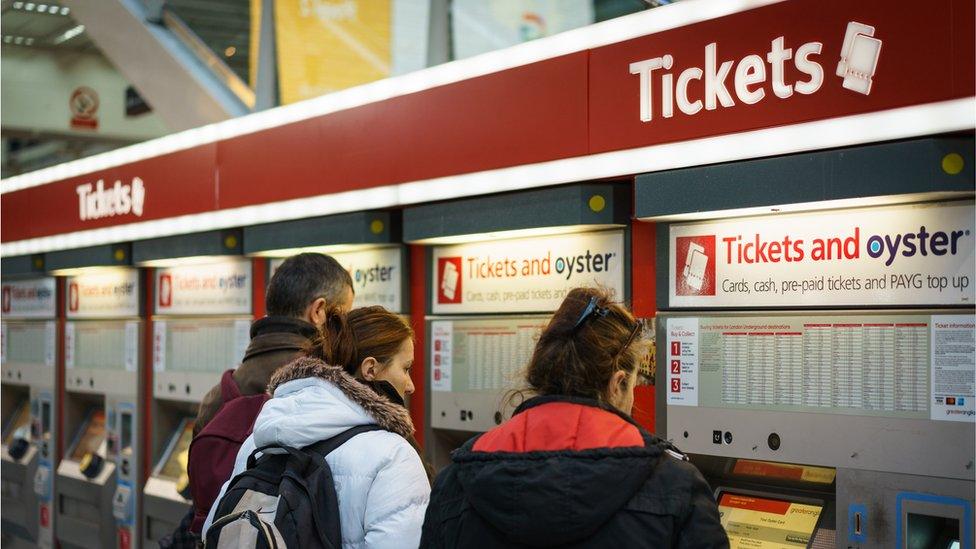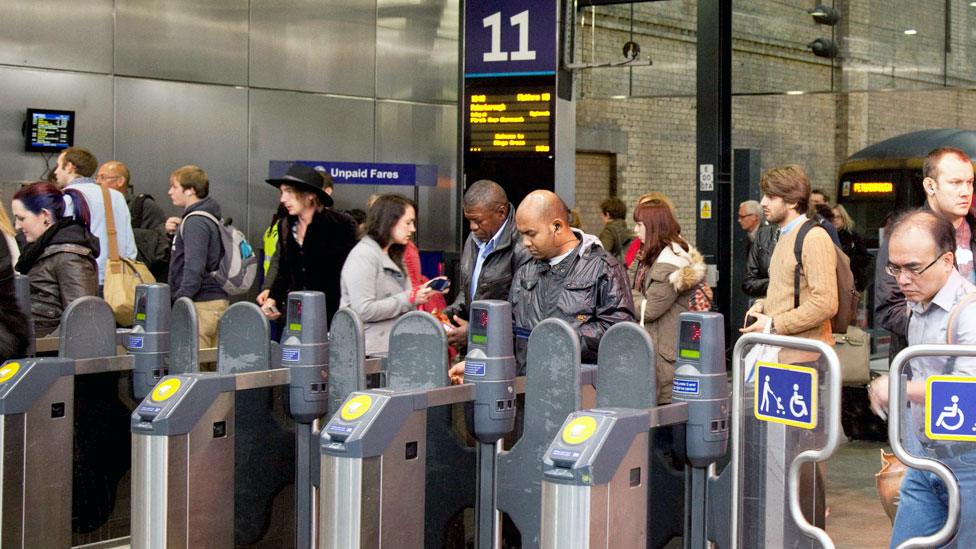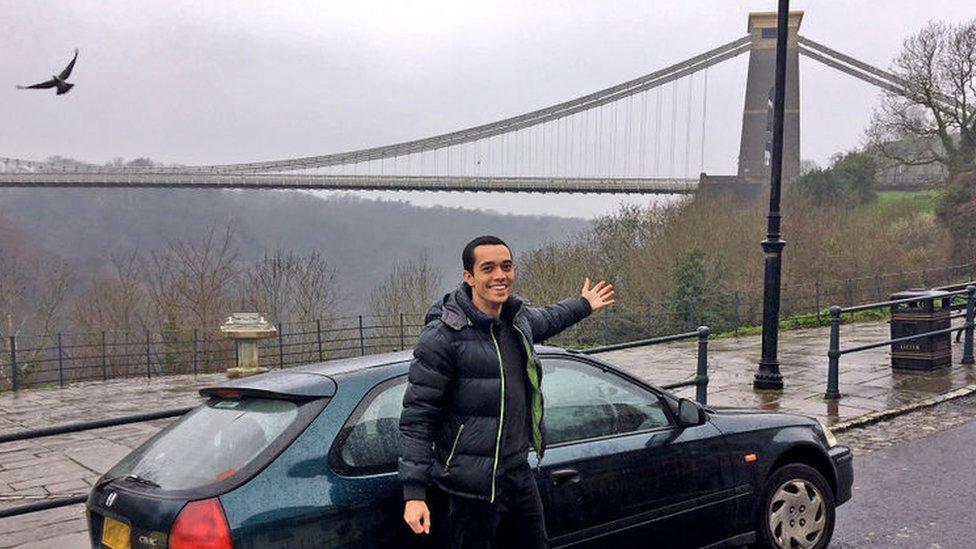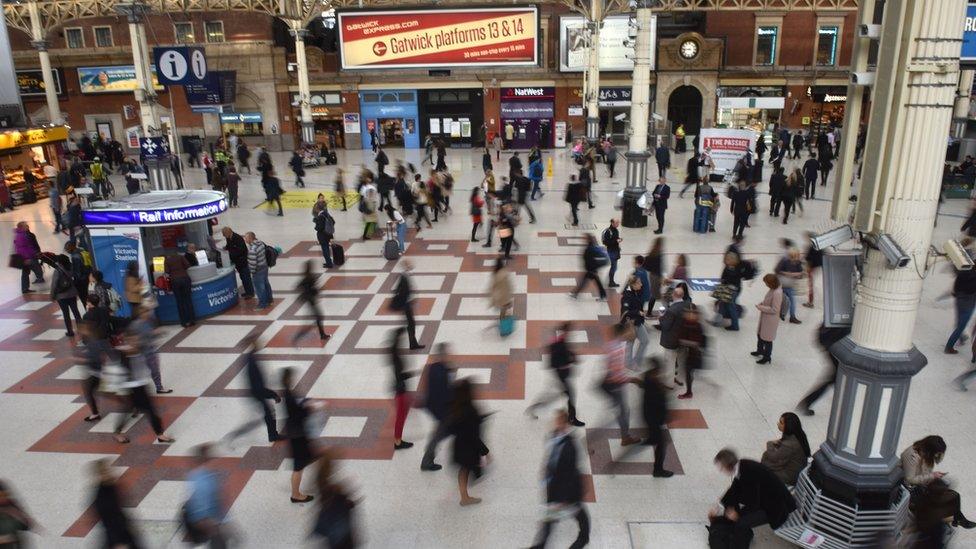Train tickets: Rail industry plans fares shake-up
- Published
- comments

Britain's rail companies are to launch a public consultation aimed at making ticketing fairer and easier to use.
The Rail Delivery Group (RDG), which represents rail firms, said about 55 million different fares exist in the current system.
A passenger group said reform was "overdue".
The industry admits passengers are not currently always offered the cheapest fare available due to "long-standing anomalies" such as split ticketing.
That means it can be cheaper for passengers to buy several tickets for a single journey than one ticket.
Another "anomaly" it highlights is the charging of a peak-time fare when half a trip is on an off-peak service.
The industry has pledged that average fares will not rise as a result of any reform.
A reformed ticketing system could include integrated tickets covering other modes of transport such as buses and trams, and more flexible tickets for part-time workers, the RDG said.
The consultation will be launched next month and will run until September. It will lead to a report containing proposals for governments to consider.

Split tickets v single fares
Buying split tickets can work out cheaper - but by how much?
Exeter Central to Sheffield on 16 June, leaving at 08:53 BST.
Split tickets: Exeter Central to Exeter St Davids (£1.40); Exeter St Davids to Bristol Temple Meads (£14.70); Bristol Temple Meads to Cheltenham Spa (£7); Cheltenham Spa to Birmingham (£9.90); Birmingham to Derby (£6.30); Derby to Sheffield (£7.50). Total: £46.80
Advance ticket: £70.20 (50% more expensive)
Oxford to Cambridge on 23 May, leaving at 10:01 BST
Split tickets, including advance fares: Oxford to London Paddington (£5.40); London Underground to Cambridge (£27.40). Total £32.80
Off-peak single: £55.60 (70% more expensive)
Leicester to Edinburgh on 18 May, leaving at 07:52 BST
Split tickets, including advance fares: Leicester to Derby (£6.70); Derby to Sheffield (£8.40); Sheffield to York (£14.10); York to Darlington (£9.10); Darlington to Edinburgh (£45.10). Total £83.40
Advance ticket: £144.10 (73% more expensive)

What are the rules around ticket sales?
Rules governing how tickets are sold and how fares are calculated date back to 1995, and it is argued they have not kept pace with technology or how people work and travel.
Three decades ago it was assumed customers bought tickets by visiting ticket offices and each of the 2,500 stations in Britain still has to sell tickets to every other station in the country.
However, the rise of smartphones has changed how people purchase tickets, while an increase in part-time and freelance work patterns means traditional season tickets are no longer an economical option.
Further layers of complexity have been added through individual franchise agreements, with little taken away.
How do UK rail fares compare to Europe?

What do the rail companies say?
Paul Plummer, chief executive of the RDG, which represents the various rail companies, has said the industry is committed to reforming "well-meaning but outdated" regulation.
"Long-standing anomalies are becoming locked in... as a result it has become increasingly difficult for rail companies to guarantee the right fare," he added.
Rail companies say they are already making improvements to fares where they can, such as cutting jargon and providing clearer information about peak and off-peak times.
However, speaking to BBC Radio 4's Today programme, Mr Plummer said that making incremental changes "compounds the problem" and that "root and branch reform" was needed.
The RDG believes a more sophisticated computer-based system of ticketing would be able to automatically offer customers the lowest fare.
A fundamental reform of how fares are designed and regulated is needed, RDG's chief executive tells Radio 4's Today

What do customers say?
News of the consultation has been met with support on social media with one Twitter user describing the current rail fare confusion as a "joke".
Jess Hare, 29, from Glasgow, contacted the BBC to explain how a station ticket machine in Worcester was selling tickets for £53 when she had seen the same journey available online for less than a third of the price.
"Thankfully I decided to ignore the machine and search online whilst standing in the station," she said.
"Sure enough, I easily found the £14 ticket, which I bought instead."
Ms Hare said she was "disgusted" to think how many people would be caught out by such unnecessary price differences.
Allow X content?
This article contains content provided by X. We ask for your permission before anything is loaded, as they may be using cookies and other technologies. You may want to read X’s cookie policy, external and privacy policy, external before accepting. To view this content choose ‘accept and continue’.
Allow X content?
This article contains content provided by X. We ask for your permission before anything is loaded, as they may be using cookies and other technologies. You may want to read X’s cookie policy, external and privacy policy, external before accepting. To view this content choose ‘accept and continue’.
What do campaigners say?
Transport Focus, a passenger interests group working on the consultation, said the debate on reform options was "overdue".
"Rail passengers want a rail fares system they can trust, that is simpler, offers better value for money and is more understandable," said the group's chief executive, Anthony Smith.
Steve Chambers, public transport campaigner at Campaign for Better Transport, welcomed the attempt to improve ticketing, but warned "it will need government support to make it happen".
Mick Cash, general secretary of the Rail, Maritime and Transport union, said that "no-one trusts" private rail firms to "do the right thing by passengers".
A Department for Transport spokeswoman said: "We want passengers to always be able to get the best possible deal on their ticket and we welcome the industry's commitment to review fares."
- Published2 January 2018

- Published12 April 2018

- Published13 December 2017
